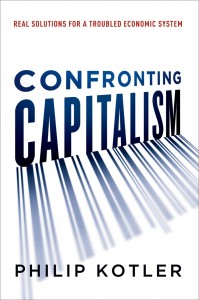
A Marketer Looks at Capitalism
Phil Kotler is well-known as one of the world’s top marketing thinkers. He did more than anyone to establish Kellogg’s reputation as a great marketing school. He is a prolific author on marketing topics.
I suspect most people don’t know that Kotler trained as an economist, studying at the University of Chicago and MIT.
In his new book, Confronting Capitalism, Kotler turns his analytic skills to the economy. This isn’t a book about marketing; it is about the much bigger question of how to optimize an economic system.
It is a sprawling book. Kotler writes about income inequality, short-term thinking, political gridlock and the environment.
The focus of the book is how to address some of the short-comings of capitalism. Kotler identifies fourteen different problems and provides ideas on how to address each one.
Kotler is in favor of an active government, with higher taxes and more regulation to address the systemic challenges of capitalism. His logic is quite convincing.
The book is worth a read; it is informative and insightful, and highlights some important issues.
It isn’t an up-lifting book; there are a lot of problems to address, many without easy solutions.
Kotler finishes the book on an optimistic note; he is confident we will address the challenges. I didn’t feel quite so cheery; there are many problems and few easy solutions.
Still, capitalism has been the world’s most successful economic system for centuries. It isn’t a perfect system. Many of the problems Kotler discusses in his book aren’t new. Despite them, we’ve managed to survive and thrive. By implementing some of Kotler’s proposed solutions we could do even better.

Well, I guess we need to read the book prior to write any insightful comment, but I could not agree more with Eduardo’s remark. Governments should confine their actions to basic services to the people: infrastructure, education, health, homeland security, and leave the rest of activities to the free interactions of organizations and people, except on those fields where regulation is needed due to the intrinsic nature of the market. This, in order to put limits to the likelyhood of corruption outbreaks.
I live in Brazil, where the govt is “active” on regulating almost everything and increases taxes like no other govt. The result – and current govt is ruling for 12 years now – is higher public debt, huge govt payroll and corruption in all fronts.
If prof Kotler believes an active, regulatory, high-tax government this is the solution, he should live here for 6 months and then write the second edition of his book with real-life experiences.